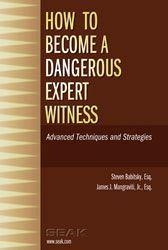 By: Steven Babitsky
By: Steven Babitsky
Excerpt from: How to Become a Dangerous Expert
Dangerous experts form and present a bulletproof expert opinion. To do this, the authors recommend the following.
- Avoid cases and counsel that place the expert on a restrictive budget or whose deadlines will not allow the expert to do a thorough job.
- Be firm in requests to retaining counsel for the time and resources required to do a first-rate job.
- Carefully and confidently state all opinions using the correct “magic words” for the case at hand.
- Do not overstate or understate your expert opinions.
- Act consistently inside and outside of the litigation.
- Be prepared to clearly and convincingly explain disagreements with the opinions of opposing experts.
- To present a legally valid, properly researched opinion, know the applicable law.
- Test alternate opinions and be prepared to explain clearly and convincingly why alternative opinions were not adopted.
- Use reliable equipment to conduct testing and measurements. Prepare to defend the reliability of the equipment in question and one’s ability to use it properly.
- Be extremely careful when taking measurements and conducting testing.
- Be well-trained and well-versed in any computer program used.
- Make sure any computer program used is a well-accepted program from a reliable company.
- Verify the results obtained by computer (for example, by using another computer program or by hand calculations).
- Know what acronyms mean in the names of computer programs used.
- Only rely upon the opinions of reputable experts and prepare to explain why one’s trust in the other expert is not misplaced.
- “Leave no stone unturned” and do the best job possible when forming an opinion.
- Document and photograph the investigation to help prove its thoroughness.
- Verify as many assumed facts as possible and prepare to explain why one’s assumptions are trustworthy.
- Be there. Make every effort to physically and personally examine all key evidence in the case.
- Examine the key evidence as quickly as possible to reduce the likelihood of its condition changing.
- Obtain and review carefully all relevant documents.
- Never testify outside of one’s true area of expertise.
- Thoroughly research the issues at hand.
- Check and recheck relevant calculations.
- Never write notes that are inflammatory, show bias, or could be used to undermine the expert’s opinion.
- Do not share draft reports with retaining counsel.
- Use a reliable, generally accepted, testable methodology and avoid “junk science.”
- Find out from retaining counsel in advance if there are likely to be any Daubert issues in the case.
- Do not allow any actions or communications with retaining counsel to create even the appearance of impropriety.
- Maintain accurate bills to minimize the chance of one’s own bills being used to undermine the expert opinion.
